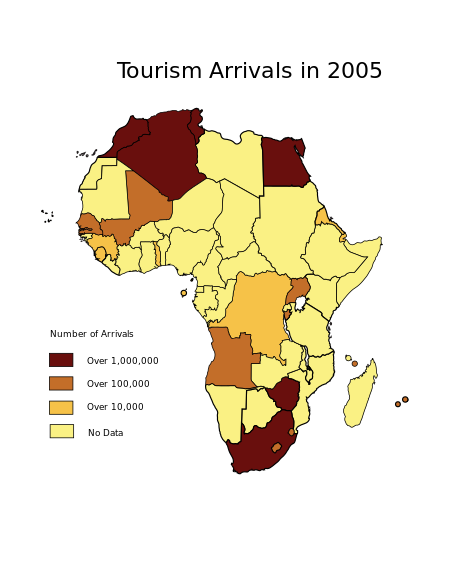Tourism in Africa


Tourism is an important economic sector for many countries in Africa. There are many countries that benefit heavily from tourism like Uganda, Algeria, Egypt, South Africa, Kenya, Morocco, Tunisia, Ghana and Tanzania.[1] The touristic particularity of Africa lies in the wide variety of points of interest, diversity and multitudes of landscapes as well as the rich cultural heritage. Also, an ecotourist industry is present in some African countries (i.e. South Africa, Kenya, Namibia, Rwanda, Zambia, Uganda, Mozambique, ...).[2]
Overview[]
This section possibly contains original research. (May 2017) |
The continent of Africa can be divided into three groups relative to tourism:
- those countries with a developed tourism industry;
- those with a developing industry;
- those that would like to develop a tourism industry.
Countries like Morocco, Egypt, South Africa and Tunisia have a successful tourism industry. Countries like Kenya, Zimbabwe, Swaziland and Mauritius can be considered as countries that have steady and consistent income from tourism. Countries like Algeria and Burundi are countries that have little to no economic benefit from tourism, but would like to see it expand.[3]
The successful countries in tourism are thriving due to a variety of factors. Countries like Morocco and Tunisia benefit from their beautiful beaches and their relative proximity to Europe. Tourism in Egypt is based on the rich history of Ancient Egypt, pyramids, artifacts and breathtaking Red Sea beaches. South Africa and Kenya benefit from wild safari expeditions, attracting tourists to see the wildlife of Africa.
Ecotourism[]

Ecotourism is the concept of responsible trips and travel to areas that might be protected and especially fragile. The intent is to create as little detrimental impact on the environment as possible. In some locations (such as Gorongosa National Park) where the wildlife has previously been decimated, rewilding has been done and much of the wildlife has been brought back (along with vegetation, thus allowing the environment to sequester more carbon then what was previously the case). This return of wildlife has created tourism opportunities (wildlife viewing, safari trips) allowing to bring in financial revenue. It also requires personnel such as park rangers, ... to be present, thus creating local employment opportunities.
Tourism by Arrivals[]
All of the data presented here is from the World Tourism Organization (UNWTO) and from "Reviewing Africa in the Global Tourism Economy."[4] The following table shows the number of arrivals in each country:

| Country[a] | Arrivals (2015) |
|---|---|
| Egypt | 17,443,000 |
| Angola | 210,000 |
| Botswana | 1,559,000 |
| Burundi | 148,000 |
| Cameroon | 210,000 |
| Cape Verde | 198,000 |
| Democratic Republic of the Congo | 61,000 |
| Djibouti | 30,000 |
| Algeria | 4,244,000 |
| Eritrea | 83,000 |
| Gambia | 111,000 |
| Guinea | 45,000 |
| Lesotho | 304,000 |
| Mali | 143,000 |
| Mauritius | 934,827 (2020)[5] |
| Morocco | 9,409,000 |
| São Tomé and Príncipe | 11,000 |
| Senegal | 769,000 |
| Seychelles | 129,000 |
| Sierra Leone | 40,000 |
| South Africa | 7,518,000 |
| Swaziland | 839,000 |
| Togo | 81,000 |
| Tunisia | 6,378,000 |
| Uganda | 1,468,000 (2017) |
| Zimbabwe | 1,559,000 |
Tourism by Receipts[]
The following map and data depict the income from tourism in US dollar equivalent:
| Country[b] | Receipts (2020) in US$ |
|---|---|
| Botswana | 562,000,000 |
| Burundi | 2,000,000 |
| Cape Verde | 123,000,000 |
| Egypt | 16,851,000,000 |
| Eritrea | 66,000,000 |
| Kenya | 879,000,000 |
| Lesotho | 30,000,000 |
| Malawi | 26,000,000 |
| Morocco | 4,617,000,000 |
| Mozambique | 130,000,000 |
| Namibia | 348,000,000 |
| Reunion | 384,000,000 |
| Seychelles | 192,000,000 |
| Sierra Leone | 83,000,000 |
| South Africa | 7,327,000,000 |
| Sudan | 89,000,000 |
| Uganda | 1,400,000,000 |
| Tunisia | 2,063,000,000 |
| Tanzania | 4,468,000,000 |
| Zimbabwe | 1,559,000 |
Notes[]
- ^ No data is available for Benin, Burkina Faso, Central African Republic, Chad, Comoros, Republic of the Congo, Côte d'Ivoire, Equatorial Guinea, Ethiopia, Gabon, Ghana, Guinea-Bissau, Kenya, Libya, Madagascar, Malawi, Mauritania, Mozambique, Namibia, Niger, Nigeria, Rwanda, Sudan, Tanzania and Zambia.
- ^ No data is available for Algeria, Angola, Benin, Burkina Faso, Cameroon, Central African Republic, Chad, Comoros, Republic of the Congo, Côte d'Ivoire, Democratic Republic of the Congo, Djibouti, Equatorial Guinea, Ethiopia, Gabon, Gambia, Ghana, Guinea, Guinea-Bissau, Libya, Madagascar, Mali, Mauritania, Niger, Nigeria, Rwanda, Sao Tome and Principe, Senegal, Togo, Swaziland and Zambia.
See also[]
- Africa-EU partnership: sustainable growth and jobs
- Climate change in Africa
- Climate change adaptation
- Eco hotel
- ECOWAS ECOTOUR
- Ecosystem restoration
- European Tourism Manifesto
- UN Decade on Ecosystem Restoration
- Safari lodge
References[]
- ^ WhiteOrange. "Homepage". Ghana Tourism Authourity. Retrieved 2020-09-03.
- ^ Africa can Benefit from Nature-based Tourism in a Sustainable Manner
- ^ Otieno, Veronica (2018-07-03). "Tourism in Africa information: Facts, Statistics, Tourism in Africa by Country 2018". TINA Magazine. Retrieved 2020-02-17.
- ^ Rogerson, Christian (2017). "Reviewing Africa in the global tourism economy", Vol. 24 No. 3 United Nations World Tourism Organization. September 2017.
- ^ "Tourist arrival 2020 (mauritius)" (PDF). Retrieved 7 January 2012.
External links[]
| Wikivoyage has a travel guide for Africa. |
![]() Media related to Tourism in Africa at Wikimedia Commons
Media related to Tourism in Africa at Wikimedia Commons
- South Africa Tours - Official travel operator in Australia, New Zealand and the United Kingdom.
- Tourism in Africa